2023届高考英语一轮复习名词性从句2 课件 (21张ppt)
文档属性
| 名称 | 2023届高考英语一轮复习名词性从句2 课件 (21张ppt) |  | |
| 格式 | pptx | ||
| 文件大小 | 938.6KB | ||
| 资源类型 | 教案 | ||
| 版本资源 | 通用版 | ||
| 科目 | 英语 | ||
| 更新时间 | 2022-11-18 12:33:50 | ||
图片预览

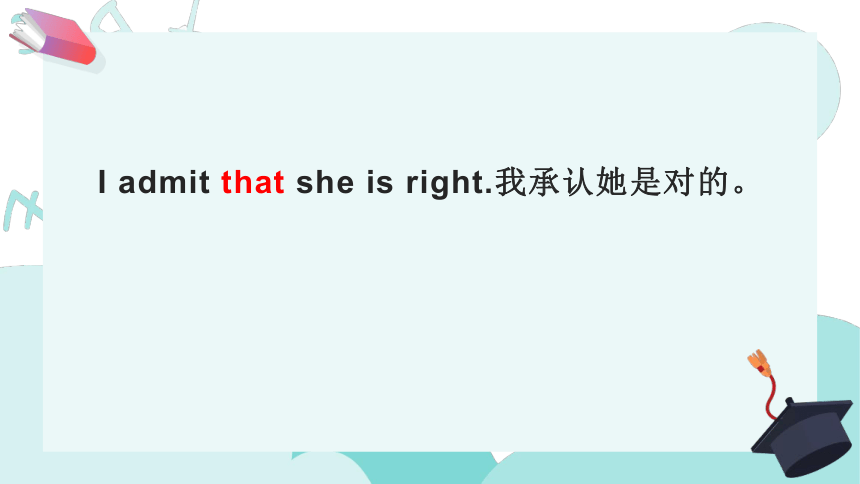
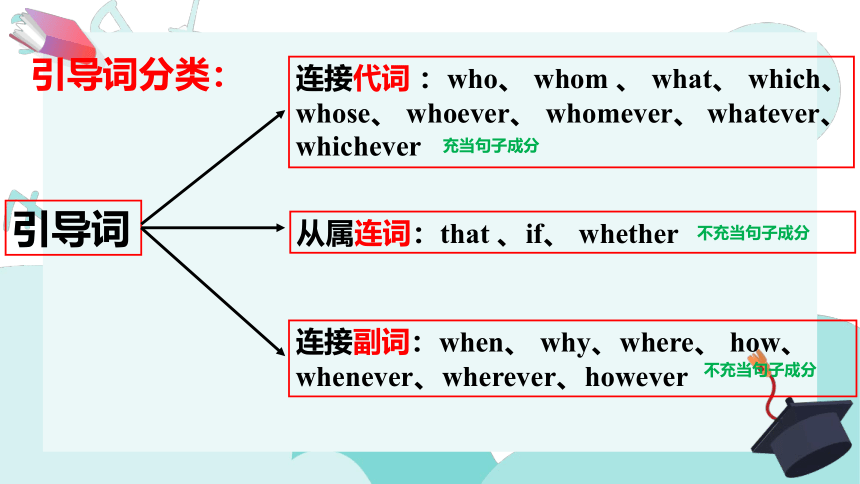

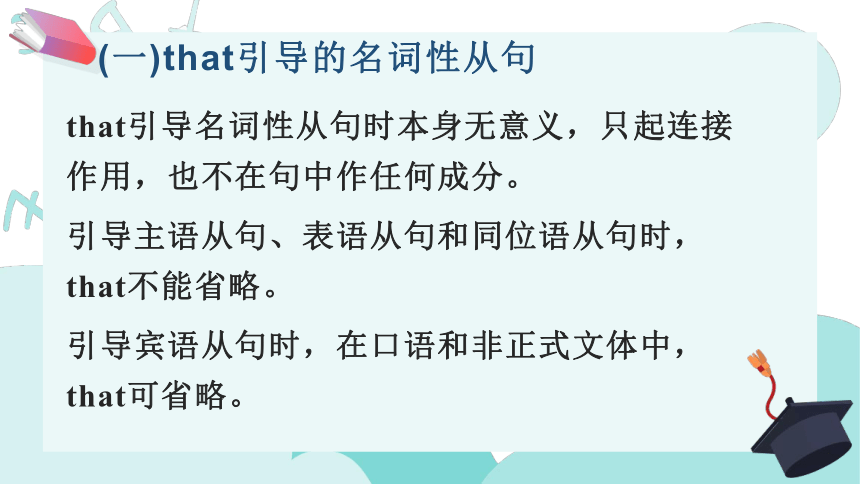
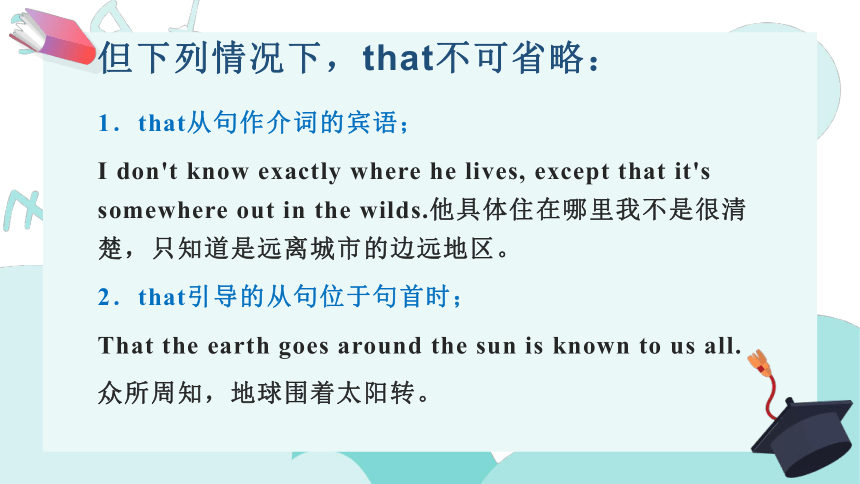

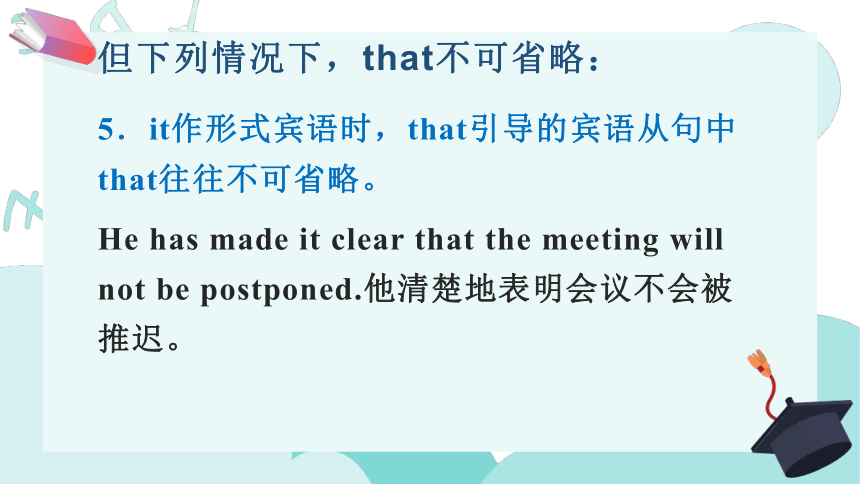
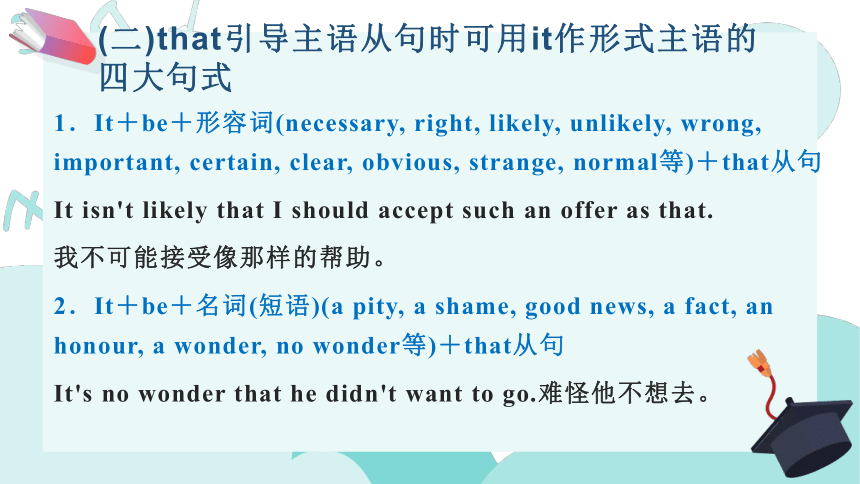
文档简介
(共21张PPT)
名词性从句2
名词性从句=名词
I admit that she is right.我承认她是对的。
连接副词:when、 why、where、 how、whenever、wherever、however
引导词
从属连词:that 、if、 whether
连接代词 :who、 whom 、 what、 which、 whose、 whoever、 whomever、 whatever、 whichever
引导词分类:
不充当句子成分
充当句子成分
不充当句子成分
that引导的名词性从句
(一)that引导的名词性从句
that引导名词性从句时本身无意义,只起连接作用,也不在句中作任何成分。
引导主语从句、表语从句和同位语从句时,that不能省略。
引导宾语从句时,在口语和非正式文体中,that可省略。
但下列情况下,that不可省略:
1.that从句作介词的宾语;
I don't know exactly where he lives, except that it's somewhere out in the wilds.他具体住在哪里我不是很清楚,只知道是远离城市的边远地区。
2.that引导的从句位于句首时;
That the earth goes around the sun is known to us all.
众所周知,地球围着太阳转。
但下列情况下,that不可省略:
3.宾语从句前有插入语时;
We hope, on the contrary, that he will stay at home with us.恰恰相反,我们希望他和我们待在家里。
4.动词后有多个that引导的宾语从句时,只有第一个that可省略,从第二个从句开始that不可省略;
He told me (that) he had to leave and that he would be back soon.他告诉我他得离开并且很快就会回来。
但下列情况下,that不可省略:
5.it作形式宾语时,that引导的宾语从句中that往往不可省略。
He has made it clear that the meeting will not be postponed.他清楚地表明会议不会被推迟。
(二)that引导主语从句时可用it作形式主语的四大句式
1.It+be+形容词(necessary, right, likely, unlikely, wrong, important, certain, clear, obvious, strange, normal等)+that从句
It isn't likely that I should accept such an offer as that.
我不可能接受像那样的帮助。
2.It+be+名词(短语)(a pity, a shame, good news, a fact, an honour, a wonder, no wonder等)+that从句
It's no wonder that he didn't want to go.难怪他不想去。
(二)that引导主语从句时可用it作形式主语的四大句式
3.It+be+过去分词(said, told, heard, reported, decided, suggested, advised, ordered, remembered, thought, considered, well known, announced等)+that从句
It is decided that the meeting has been put off until next Monday.会议被推迟到下周一已经定下来了。
(二)that引导主语从句时可用it作形式主语的四大句式
4.It+特殊动词或短语(seem, appear, happen, matter, turn out, occur to, make no difference等)+that从句
It suddenly occurred to her that Joe was afraid of being alone.
她突然想到乔害怕独自一个人待着。
whether与if
3、用if,不用whether互换的情况
(1)宾语从句是否定句时,只用if,不用whether。
e.g. I wonder if it doesn’t rain.
(2)但引导条件从句时,只能用if,而不能用whether。
e.g. It depends on whether we have enough time.
They don’t know whether to go there.
Please come to see me if you have time.
1.用whether或if均可的情况
(1)whether可引导各种名词性从句。引导大部分动词后的宾语从句时,两者均可。
(2)it作形式主语,且主语从句在句末时,两者均可引导主语从句。
It's uncertain whether/if he'll come this evening.
他今天晚上是否会来还不确定。
2.用whether而不用if的情况
(1)主语从句和宾语从句置于句首时;
Whether we can have clean drinking water lies in what effective measures will be taken by the government about water pollution.
我们能否有干净的饮用水取决于政府将采取什么样的有效措施处理水污染问题。
2.用whether而不用if的情况
(2)引导表语从句和同位语从句时;
The problem is whether the air pollution can be controlled.
问题是空气污染能否被控制住。
He asked me the question whether we should give money to the homeless.
他问了我我们是否该给无家可归者钱的问题。
2.用whether而不用if的情况
(3)引导介词的宾语从句时;
It depends on whether we have enough time.
这取决于我们是否有充足的时间。
(4)宾语从句中的whether 与or not连用。
I don't know whether or not the report is true.
=I don't know whether the report is true or not.
我不知道这个报道是否是真的。
2.用whether而不用if的情况
(5)引导词后接to do时;
They don't know whether to go there.
他们不知道是否去那里。
(6)有些动词如leave, put, discuss, decide等后的宾语从句;
We discussed whether we should hold a meeting.
我们讨论了我们是否应召开一个会议。
2.用whether而不用if的情况
(7)避免用if引导产生歧义。
Let me know whether you are coming to our party.
让我知道你是否来参加我们的宴会。
wh-和wh-ever
1)区分使用wh-和wh-ever:
wh 有疑问的意思;
wh-ever有肯定强调的意思
*Who will be invited hasn’t been decided.*Whoever comes here is welcomed.*A reward of $1,000 will be given to whoever can provide any clues to the case.*The gift will be given to whomever I like.
名词性从句2
名词性从句=名词
I admit that she is right.我承认她是对的。
连接副词:when、 why、where、 how、whenever、wherever、however
引导词
从属连词:that 、if、 whether
连接代词 :who、 whom 、 what、 which、 whose、 whoever、 whomever、 whatever、 whichever
引导词分类:
不充当句子成分
充当句子成分
不充当句子成分
that引导的名词性从句
(一)that引导的名词性从句
that引导名词性从句时本身无意义,只起连接作用,也不在句中作任何成分。
引导主语从句、表语从句和同位语从句时,that不能省略。
引导宾语从句时,在口语和非正式文体中,that可省略。
但下列情况下,that不可省略:
1.that从句作介词的宾语;
I don't know exactly where he lives, except that it's somewhere out in the wilds.他具体住在哪里我不是很清楚,只知道是远离城市的边远地区。
2.that引导的从句位于句首时;
That the earth goes around the sun is known to us all.
众所周知,地球围着太阳转。
但下列情况下,that不可省略:
3.宾语从句前有插入语时;
We hope, on the contrary, that he will stay at home with us.恰恰相反,我们希望他和我们待在家里。
4.动词后有多个that引导的宾语从句时,只有第一个that可省略,从第二个从句开始that不可省略;
He told me (that) he had to leave and that he would be back soon.他告诉我他得离开并且很快就会回来。
但下列情况下,that不可省略:
5.it作形式宾语时,that引导的宾语从句中that往往不可省略。
He has made it clear that the meeting will not be postponed.他清楚地表明会议不会被推迟。
(二)that引导主语从句时可用it作形式主语的四大句式
1.It+be+形容词(necessary, right, likely, unlikely, wrong, important, certain, clear, obvious, strange, normal等)+that从句
It isn't likely that I should accept such an offer as that.
我不可能接受像那样的帮助。
2.It+be+名词(短语)(a pity, a shame, good news, a fact, an honour, a wonder, no wonder等)+that从句
It's no wonder that he didn't want to go.难怪他不想去。
(二)that引导主语从句时可用it作形式主语的四大句式
3.It+be+过去分词(said, told, heard, reported, decided, suggested, advised, ordered, remembered, thought, considered, well known, announced等)+that从句
It is decided that the meeting has been put off until next Monday.会议被推迟到下周一已经定下来了。
(二)that引导主语从句时可用it作形式主语的四大句式
4.It+特殊动词或短语(seem, appear, happen, matter, turn out, occur to, make no difference等)+that从句
It suddenly occurred to her that Joe was afraid of being alone.
她突然想到乔害怕独自一个人待着。
whether与if
3、用if,不用whether互换的情况
(1)宾语从句是否定句时,只用if,不用whether。
e.g. I wonder if it doesn’t rain.
(2)但引导条件从句时,只能用if,而不能用whether。
e.g. It depends on whether we have enough time.
They don’t know whether to go there.
Please come to see me if you have time.
1.用whether或if均可的情况
(1)whether可引导各种名词性从句。引导大部分动词后的宾语从句时,两者均可。
(2)it作形式主语,且主语从句在句末时,两者均可引导主语从句。
It's uncertain whether/if he'll come this evening.
他今天晚上是否会来还不确定。
2.用whether而不用if的情况
(1)主语从句和宾语从句置于句首时;
Whether we can have clean drinking water lies in what effective measures will be taken by the government about water pollution.
我们能否有干净的饮用水取决于政府将采取什么样的有效措施处理水污染问题。
2.用whether而不用if的情况
(2)引导表语从句和同位语从句时;
The problem is whether the air pollution can be controlled.
问题是空气污染能否被控制住。
He asked me the question whether we should give money to the homeless.
他问了我我们是否该给无家可归者钱的问题。
2.用whether而不用if的情况
(3)引导介词的宾语从句时;
It depends on whether we have enough time.
这取决于我们是否有充足的时间。
(4)宾语从句中的whether 与or not连用。
I don't know whether or not the report is true.
=I don't know whether the report is true or not.
我不知道这个报道是否是真的。
2.用whether而不用if的情况
(5)引导词后接to do时;
They don't know whether to go there.
他们不知道是否去那里。
(6)有些动词如leave, put, discuss, decide等后的宾语从句;
We discussed whether we should hold a meeting.
我们讨论了我们是否应召开一个会议。
2.用whether而不用if的情况
(7)避免用if引导产生歧义。
Let me know whether you are coming to our party.
让我知道你是否来参加我们的宴会。
wh-和wh-ever
1)区分使用wh-和wh-ever:
wh 有疑问的意思;
wh-ever有肯定强调的意思
*Who will be invited hasn’t been decided.*Whoever comes here is welcomed.*A reward of $1,000 will be given to whoever can provide any clues to the case.*The gift will be given to whomever I like.
